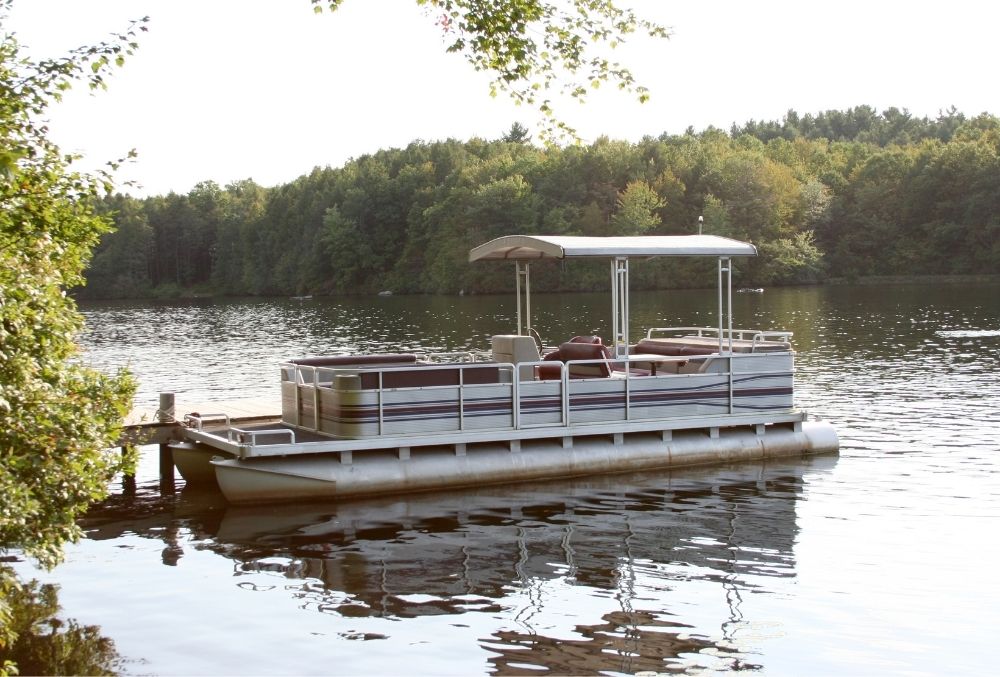When you think of a pontoon boat what comes to mind? Pleasure, relaxation, family?
The initial reaction to this type of boat is probably all three of these. Often enough you would have seen one of these boats, flat with a large deck, pontoons keeping them afloat.
They are perfect for those who wish to relax on the lake on a family vacation, perhaps to take part in some crazy water sports or just to watch the world go by as you relax on the deck with a glass of wine.

But the question is, can pontoon boats survive the ocean?
In an ideal world, these boats are made for inland use – they are smaller, and we all know the risks of smaller boats in heavy waters. But does this mean it’s an absolute no-go?
For many, if not all, the concern of this question is related to safety. Especially if you are wanting to sail out with loved ones, is it worth the risk? Is there even any risk at all?
The short answer – can pontoon boats go out in the ocean? Yes.
Now, is it safe? That is all dependant on a variety of factors.
Pontoon Boat Construction
Before delving further into the health and safety, it is worth analysing the construction of the pontoon boat itself and how that plays a role in the question.
Typically, your pontoon boat is on the smaller scale, decks known to being as small as 14 feet long. This makes it great for intimate excursions, a nice luxury possession to take out on a summer’s day.
As well as this, the boats are made with pontoons which allow the boat to stay afloat and steady. This, too, adds to the relaxing motion of the boast on calm water.
Overall, your pontoon boat is naturally designed for rivers, due to its smaller capacity, its lightweight build and open deck. But that is not to say it is not strong.
Pontoons are known to be airtight and hollow, and this allows a further sturdiness and strength making them virtually unsinkable.
What Pontoon Boat Should You Get?
Based on construction, it is best to look towards newer models. Newer models offer larger pontoon boats than were offered before. Some even come with three tubes rather than the usual two, allowing for better stability on the sea.
But is this safe enough? It is true that newer constructions of the pontoon boat are more sustainable due to their larger size, extended room and three tubes, but how well does this work in the ocean?
Risks
To own a boat, it is important think responsibly. This boat is your pride and joy and the worst thing that can happen is for it to get completely ruined. Is taking your pontoon boat out into the ocean, into the open waters, worth it?
Well, if one thing’s for sure, it is not an impossible task. It can be done, but you should first know what precautions to take and how this will affect the pleasantness of your boat experience.
Saltwater
Pontoon boats are not made for saltwater – this is because of the material of the pontoon itself and the risk of corrosion which comes with it – however this doesn’t mean that it can’t be done. Once you have taken the proper precautions it is possible to use on saltwater with little problem.
- Coat your tubes – Before taking the boat out to sea, ensure that you coat the boat’s tubes with an anti-fouling bottom paint.
- Rinse – After taking your pontoon boat out of the water, make sure to thoroughly rinse with fresh water – this will stop the higher risks of corrosion.
Rough Waters
With the structure of the pontoon boat it comes by no surprise that the power of the open water can overpower the boat. It is important to acknowledge the strength of the ocean and the power it has to conquer a vessel.
On average, it is recommended for boats to be a minimum of 40 feet long to sail at sea – this is because it is stronger, more capable, and there is more room for safety measures and passengers.
Although some pontoon boats can stretch as far as 30 feet in length, especially with newer models, it is still a risk to take. It is not only about size, but also about strength and power.
Pontoon boats are:
- Made for calm waters – Pontoon boats are typically made for calmer waters such as rivers and lakes, and are made with an open flat surface for people to leisure in. If an instance comes where you are faced with heavy waters, the pontoon boat leaves lack of protection.
- Designed to glide – These boats are designed to glide on water, so in a situation where you happen to encounter horrific waves, there would be an unlikely chance the pontoon boat would survive (you would not want to be in a situation where your boat flips over).
- Slow – Unless you’ve paid an extensive amount of money for your pontoon boat, it is rare you will find a speedy vessel. This is fine if used for its purpose, but if out in the ocean and you need to make your getaway before the storm hits, there is a risk with safety.

Safety Measures
Now we’ve passed all the negatives, there is some light after the storm. There will always be risks to using your pontoon boat outside of its purpose, however there are safety measures you can put in place in order to use this boat in the ocean.
Warranty
Before considering taking it out into the open sea, it is very important to first look into the warranty of the boat. If anything happens to the boat whilst out in the ocean, such as corrosion from saltwater, you have to be reassured that you are protected.
Keep Close To Shore
If you do decide to take your pontoon boat out into the ocean, it would be better to watch your distance from the shore. The closer to the shore you are, the safer. This decreases the risk of exposure to storms/waves.
Invest In The Right Pontoon Boat
Saltwater is one of the biggest factors, so if you’re thinking about sailing your boat out to sea look into saltwater resistant pontoon boats.
There are many features of the boat which make them suitable for saltwater, including:
- An aluminum base
- Bolted down decks
- Larger boat length
- Powerful engine
Maintaining Your Weight Load
When out in open water, make sure to maintain an even weight load in the boat. It may not be the best decision to overload your pontoon boat as centre of gravity is everything.
The weight of the boat includes extra cargo, any add-ons, and even passengers. This is important particularly if having to handle heavy waters.
Know How To Drive
Know the best way to drive your vessel if in contact with rough waters. The best solution would be to turn around and head back to shore, but if you want to try to drive away from the forceful water remember to:
- Take your turns wide
- Don’t force yourself into upcoming wind
- Do not slow down
Conclusion
As the owner of the boat, it is your duty to ensure the safety of the vessel, the passengers, and to understand the risks of taking it out into certain waters. To take a pontoon boat out into the ocean is a risk for many reasons discussed.
It is not designed to be taken out into open water but designed for leisure purposes such as going fishing or for sunbathing on. As well as this its size also raises issue. Boats are essentially designed to be larger for open water due to the mere power of the ocean.
A large boat is strong enough to withhold the bumps and waves of the sea, however with a pontoon boat there are higher risks of it capsizing, especially when face to face with potential large waves.
The vessel too does not fit the design criteria – its flat surface means higher chances for potential flooding.
But we have also discovered that there are ways around these negatives.
It is all dependent on your own initiative. Research the best saltwater resistant pontoon boats to take out into the ocean, know how much weight you are carrying and take note of how safe that weight load is, invest in tools which will help protect your boat.
So, overall, can pontoon boats go in the ocean? Yes, they can. Is it safe? Once precautions are met, it can be. As long as these precautions are met there is nobody to tell you no to sailing your pontoon into the ocean.
The easiest way to guarantee a safer journey is to invest in a safer and more reliable model – by doing so you will be able to take your pontoon out and stay responsible when doing so.
